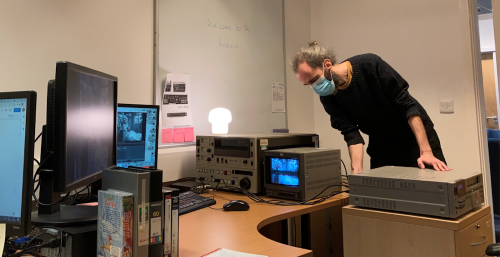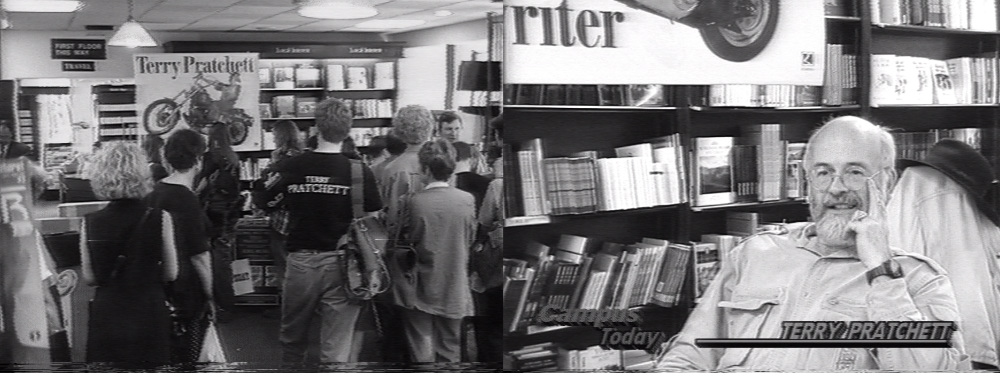Mark Simon Haydn is the Digital Preservation Archivist at the Borthwick Institute for Archives at the University of York
In keeping with other reports from the field on the DPC blog, the last twelve months at the Borthwick have deeply involved increased supply and demand of digital collection material. In addition to daily reprographics work performed by the Institute’s searchroom team, there has been great progress with the delivery of grant projects: from significant Music Preserved digitisation supporting the British Library’s Unlocking Our Sound Heritage scheme, performed by Nick Melia, to Chris Taylor’s extensive photography of ephemera recording the activities of regional music societies in the InterMusE project, collections have continued to reach users and inform research in spite of all the obvious obstacles to access, a temporary change in behaviour that suggests a new normal of remote access. Since stepping in as the temporary Digital Preservation Archivist in June, I’ve had chance to spend some time building up the capacity to appraise and transfer some of the Borthwick’s magnetic media holdings, audio and video recordings physically cared for by the Institute’s conservation staff but long inaccessible to researchers in the absence of adequate playback equipment.
Informed by similar efforts at libraries and archives elsewhere, and attentive to the wider establishment of Memory Labs, we have been able to take the first steps toward building a robust transfer station to digitise the contents of any VHS or U-Matic tapes sprinkled throughout our late-20th century collections, addressing the urgent risk of losing access to important cultural heritage material in the face of degralescence. In practical terms, this has involved forgoing the soothing beige admin of selecting equipment from archival supply catalogues and turning instead to trawling eBay, wading through combo-VCR/DVD deck listings to source still-functioning 1980s playback machines. With our equipment tested and up and running, we have made a start on appraising and digitising VHS from the stacks, beginning with a preliminary survey of the Barry Took Archive, a collection rich with unindexed material likely to include non-circulating episodes of Took’s early eighties barometer of broadcast propriety Points of View.

Videos from the Barry Took Archive (BTOO), including images of the BBC series Points of View
Building capacity to work with these materials supports the Borthwick’s obligations to its collections and visitors at every level. The possibility of facilitating future access to videos currently dependent on increasingly specialised playback equipment is established, the first step in a chain of actions necessary to stay ahead of obsolescence, not only of physical apparatus but in codecs and standards subject to constant revision. Addressing this material at the end of its carrier lifespan ensures we can preserve unique records of the activities of University groups like York Student Television, and unlock moving image material held in the Borthwick’s theatre and entertainment collections. Archivists at the Borthwick are able to gain additional contextual knowledge about collections like the Joseph Rowntree Foundation Archive or Alcoholics Anonymous Great Britain Archive, the voices and images captured in advertisements, programmes and documentaries illuminating the histories contained in our collections.
The full continuum of emotions elicited by analog video preservation workflows will be familiar across DPC member institutions, an audiovisual Seven Stages of Grief encompassing meandering YouTube tutorials, non-ejecting cassettes, deep immersion in hobbyist forums to freely obtain repair manual scans otherwise only available as dubious PDFs. However imposing these obstacles are, a community presence around video preservation provides robust and responsive support, dedicated to demystification, continuing in the spirit of earlier efforts to pool and share technical knowledge. An archivist confronting unfamiliar analog inputs might consult the Cable Bible, or turn to a wiring diagram on XFR Collective’s GitHub repository; others working through initial decisions around budgeting or scoping might refer to the scenarios posed in the DPC publication Pragmatic Audiovisual Preservation (authored by Ashley Blewer, also responsible for the essential Minimum Viable Station resource), weighing suitable ways forward sensitive to institutional means and capacity. Support for small teams and lone arrangers is available through workshops held during conferences; vocabulary for errors encountered during transfer is supplied by the AV Artifact Atlas; authoritative guidelines for vendor relations are distributed by institutions; and microgrants are awarded by community groups and non-profits. The benefits of this work - transparency, problem-solving, knowledge-sharing - are widely felt and should dictate the dissemination of the Borthwick’s experiences in this area in the future.
 Digitisation work in progress at the Borthwick Institute
Digitisation work in progress at the Borthwick Institute
After initial attention to equipment and carrier types, I am currently focusing on organising the extensive array of descriptive, technical, preservation and rights metadata that will sit alongside new digital assets in our AIPs, necessary to ensure objects can be interpreted by researchers and archivists in the future, encoding information on the transformations made between analogue objects and their digital surrogates. The horizon for this work is long, with the potential to improve - upgrading from composite to S-Video capture; automating associated preservation and migration actions - and expand, addressing other inaccessible formats held at the Borthwick, like tranches of Betamax in the Marks and Gran Archive. This progress is occurring while video capture runs in the background, VHS smoothly, U-Matics a work in progress; most recently we have digitised fragments capturing on-campus broadcast activity at York Student Television during the nineties: a 1995 encounter with author Terry Pratchett at the High Ousegate Waterstones; a pop quiz on campus shop prices with a former Vice-Chancellor Sir Ron Cooke:
 "I can't walk past a hat shop" - author Terry Pratchett interviewed by York Student Television (UoY/YSTV)
"I can't walk past a hat shop" - author Terry Pratchett interviewed by York Student Television (UoY/YSTV)

U-Matic capture of a York Student Television interview with former Vice-Chancellor Sir Ron Cooke (UoY/YSTV), alongside an AV Artifact Atlas entry describing the video tracking error exhibited during playback
This digital preservation work builds on a wealth of previous investment of time and resources, notably in detailed surveys inventorying media held in collections, and is dependent on condition assessments conducted by conservator Catherine Firth. Seizing the means of digitisation positions the Borthwick to attend to the full range of material deposited in incoming collections, helping us make access possible for our community of researchers and visitors, onsite and offsite, now and in the future.













































































































































